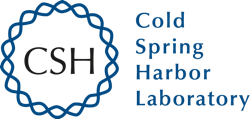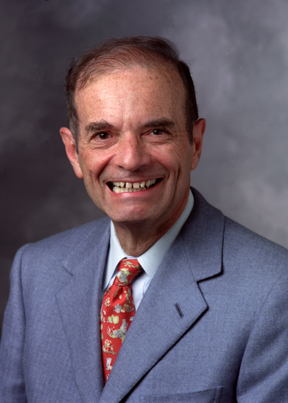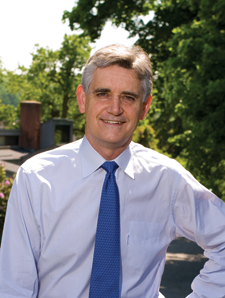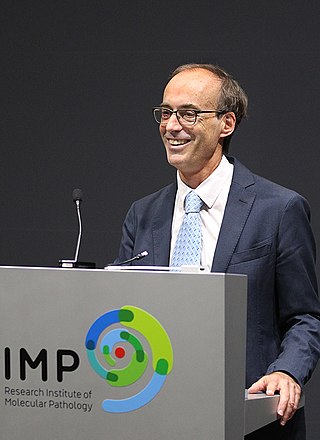Related Research Articles

Cold Spring Harbor Laboratory (CSHL) is a private, non-profit institution with research programs focusing on cancer, neuroscience, plant biology, genomics, and quantitative biology.

Carlos José Bustamante is a Peruvian-American scientist. He is a member of the National Academy of Sciences.

Randy Wayne Schekman is an American cell biologist at the University of California, Berkeley, former editor-in-chief of Proceedings of the National Academy of Sciences and former editor of Annual Review of Cell and Developmental Biology. In 2011, he was announced as the editor of eLife, a new high-profile open-access journal published by the Howard Hughes Medical Institute, the Max Planck Society and the Wellcome Trust launching in 2012. He was elected to the National Academy of Sciences in 1992. Schekman shared the 2013 Nobel Prize for Physiology or Medicine with James Rothman and Thomas C. Südhof for their ground-breaking work on cell membrane vesicle trafficking.
Tom Maniatis, is an American professor of molecular and cellular biology. He is a professor at Columbia University, and serves as the Scientific Director and CEO of the New York Genome Center.

Bruce Michael Alberts is an American biochemist and the Chancellor’s Leadership Chair in Biochemistry and Biophysics for Science and Education, Emeritus at the University of California, San Francisco. He has done important work studying the protein complexes which enable chromosome replication when living cells divide. He is known as an original author of the "canonical, influential, and best-selling scientific textbook" Molecular Biology of the Cell, and as Editor-in-Chief of Science magazine.

Gerald Francis "Jerry" Joyce is the president at Salk Institute for Biological Studies, where he was chief science officer and senior vice president from 2022 to 2023. Formerly, he was the director of the Genomics Institute of the Novartis Research Foundation. He is best known for his work on in vitro evolution, for the discovery of the first DNA enzyme (deoxyribozyme), for his work in discovering potential RNA world ribozymes, and more in general for his work on the origin of life.

Lubert Stryer is the Emeritus Mrs. George A. Winzer Professor of Cell Biology, at Stanford University School of Medicine. His research over more than four decades has been centered on the interplay of light and life. In 2007 he received the National Medal of Science from President Bush at a ceremony at the White House for elucidating the biochemical basis of signal amplification in vision, pioneering the development of high density microarrays for genetic analysis, and authoring the standard undergraduate biochemistry textbook, Biochemistry. It is now in its ninth edition and also edited by Jeremy Berg, John L. Tymoczko and Gregory J. Gatto, Jr.

Eva Nogales is a Spanish-American biophysicist at the Lawrence Berkeley National Laboratory and a professor at the University of California, Berkeley, where she served as head of the Division of Biochemistry, Biophysics and Structural Biology of the Department of Molecular and Cell Biology (2015–2020). She is a Howard Hughes Medical Institute investigator.

John Kuriyan is the Dean of Basic Sciences and a Professor of Biochemistry at Vanderbilt University School of Medicine. He was formerly the Chancellor's Professor at the University of California, Berkeley in the departments of Molecular and Cell Biology (MCB) and Chemistry, a Faculty Scientist in Berkeley Lab's Physical Biosciences Division, and a Howard Hughes Medical Institute investigator. He is a member of the National Academy of Sciences and he has also been on the Life Sciences jury for the Infosys Prize in 2009, 2019 and 2020.
Robert Tjian is a Hong Kong-born American biochemist best known for his work on eukaryotic transcription. He is currently Professor of Biochemistry and Molecular Biology at the University of California, Berkeley and an Investigator of the Howard Hughes Medical Institute (HHMI). On April 1, 2009, Tjian became the President of HHMI. On August 4, 2015, he announced that he would step down as President at the end of 2016.
Thomas J. Kelly is an American cancer researcher whose work focuses on the molecular mechanisms of DNA replication. Kelly is director of the Sloan-Kettering Institute, the basic research arm of the Memorial Sloan-Kettering Cancer Center. He holds the Center's Benno C. Schmidt Chair of Cancer Research.

Bruce William Stillman, AO, FAA, FRS is a biochemist and cancer researcher who has served as the Director of Cold Spring Harbor Laboratory (CSHL) since 1994 and President since 2003. He also served as the Director of its NCI-designated Cancer Center for 25 years from 1992 to 2016. During his leadership, CSHL has been ranked as the No. 1 institution in molecular biology and genetics research by Thomson Reuters. Stillman's research focuses on how chromosomes are duplicated in human cells and in yeast Saccharomyces cerevisiae; the mechanisms that ensure accurate inheritance of genetic material from one generation to the next; and how missteps in this process lead to cancer. For his accomplishments, Stillman has received numerous awards, including the Alfred P. Sloan, Jr. Prize in 2004 and the 2010 Louisa Gross Horwitz Prize, both of which he shared with Thomas J. Kelly of Memorial Sloan-Kettering Cancer Center, as well as the 2019 Canada Gairdner International Award for biomedical research, which he shared with John Diffley.
Taekjip Ha is a South Korean-born American biophysicist who is currently a Bloomberg Distinguished Professor of Biophysics and Biomedical Engineering at Johns Hopkins University. He was previously the Gutgsell Professor of Physics, at University of Illinois at Urbana-Champaign where he was the principal investigator of Single Molecule Nanometry group. He is also a Howard Hughes Medical Institute investigator.

Jennifer Anne Doudna is an American biochemist who has done pioneering work in CRISPR gene editing, and made other fundamental contributions in biochemistry and genetics. Doudna was one of the first women to share a Nobel in the sciences. She received the 2020 Nobel Prize in Chemistry, with Emmanuelle Charpentier, "for the development of a method for genome editing." She is the Li Ka Shing Chancellor's Chair Professor in the Department of Chemistry and the Department of Molecular and Cell Biology at the University of California, Berkeley. She has been an investigator with the Howard Hughes Medical Institute since 1997.

Ronald David Vale ForMemRS is a biochemist and cell biologist. He is a professor at the Department of Cellular and Molecular Pharmacology, University of California, San Francisco. His research is focused on motor proteins, particularly kinesin and dynein. He was awarded the Canada Gairdner International Award for Biomedical Research in 2019, the Shaw Prize in Life Science and Medicine in 2017 together with Ian Gibbons, and the Albert Lasker Award for Basic Medical Research in 2012 alongside Michael Sheetz and James Spudich. He is a fellow of the American Academy of Arts and Sciences and a member of the National Academy of Sciences. He was the president of the American Society for Cell Biology in 2012. He has also been an investigator at the Howard Hughes Medical Institute since 1995. In 2019, Vale was named executive director of the Janelia Research Campus and a vice president of HHMI, his appointment began in early 2020.

Lucy Shapiro is an American developmental biologist. She is a professor of Developmental Biology at the Stanford University School of Medicine. She is the Virginia and D.K. Ludwig Professor of Cancer Research and the director of the Beckman Center for Molecular and Genetic Medicine.
John E. Dowling is an American neuroscientist and Gordon and Llura Gund Research Professor of Neurosciences at Harvard University. He is best known for his seminal work in vision science, having elucidated the biochemistry of rhodopsin and development of the vertebrate retina, as well as diseases that affect vision such as vitamin A deficiency and retinitis pigmentosa. He was elected to the American Academy of Arts and Sciences in 1972, the National Academy of Sciences in 1976, and the American Philosophical Society in 1992.
John Francis Xavier Diffley is an American biochemist and Associate Research Director at the Francis Crick Institute. He is known for his contributions to the understanding of how DNA replication is initiated, and how it is subsequently regulated throughout the cell cycle and in response to DNA damage.
Julian Blow is a molecular biologist, Professor of Chromosome Maintenance, and Dean of the School of Life Sciences, University of Dundee, Scotland.
Susan Thomas Lovett is an American molecular biologist who is the Abraham S. and Gertrude Burg Professor of Microbiology at Brandeis University. She is interested in the mechanisms that allow the genetic material in cells to remain stable over time.
References
- 1 2 "Michael Botchan". Berkeley Research. Retrieved 2017-07-03.
- 1 2 3 "Michael Botchan named dean of biological sciences". Berkeley News. 2017-05-15. Retrieved 2017-07-03.
- ↑ "Michael Botchan". Cold Spring Harbor Laboratory Oral History Collection. Retrieved 2017-07-03.
- ↑ "Medical Advisory Board". Howard Hughes Medical Institute. Retrieved 2017-07-03.
- ↑ "American Academy of Arts and Sciences Announces New Members". HHMI.org. 2006-04-25. Retrieved 2017-07-03.
- ↑ "List of Active Members by Class" (PDF). American Academy of Arts and Sciences. Retrieved 2017-07-03.
- ↑ "Michael Botchan". National Academy of Sciences Member Directory. Retrieved 2017-07-03.